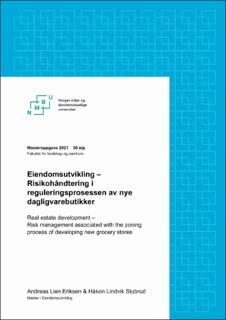| dc.contributor.advisor | Holsen, Terje | |
| dc.contributor.author | Eriksen, Andreas Lien | |
| dc.contributor.author | Stubrud, Håkon Lindvik | |
| dc.date.accessioned | 2021-10-25T13:04:30Z | |
| dc.date.available | 2021-10-25T13:04:30Z | |
| dc.date.issued | 2021 | |
| dc.identifier.uri | https://hdl.handle.net/11250/2825425 | |
| dc.description.abstract | Masteroppgaven omhandler reguleringsprosessen av nye lavpris dagligvarebutikker på Østlandet, med unntak av Oslo. Formålet med oppgaven er å belyse hvordan eiendomsutviklere kan optimalisere reguleringsprosessen, slik at den helhetlige risikoen reduseres. Vi har med bakgrunn i dette benyttet følgende problemstilling:
“Hvordan kan eiendomsutviklere i dagligvarebransjen optimalisere reguleringsprosessen, som virkemiddel for å redusere den helhetlige risikoen?”
For å besvare denne problemstillingen har vi også utarbeidet fem forskningsspørsmål. Oppgavens teorigrunnlag omhandler hovedsakelig risiko og forhandlinger, og benyttes til å belyse funn i empirien. Empirien er innhentet ved bruk av kvalitative intervjuer med nøye utvalgte informanter, herunder fire eiendomsutviklere, to reguleringsarkitekter og to kommuner. Dette har gitt unik innsikt i de ulike informantenes egne tanker og erfaringer knyttet til risiko i reguleringsprosessen. Kombinasjonen av teori og empiri i forbindelse med forskningsspørsmålene, har gitt et godt grunnlag for å belyse oppgavens problemstilling.
Funnene i oppgaven kan brukes som verktøy til å forstå hvor risiko oppstår og hva man kan gjøre for å redusere den. Masteroppgaven avdekker parkeringsbestemmelser, rekkefølgekrav og det politiske aspektet som sentrale risikoelementer, mens det antydes at motstridende planer og føringer kan være utfordrende. Oppgaven har belyst lobbyvirksomhet, tidlig kartlegging av interessenter, samt lokalkunnskap som risikoreduserende virkemidler. Videre avdekkes det at tillit og kommunikasjon er sentralt for en effektiv reguleringsprosess. Det danner grunnlaget for flerdimensjonale integrasjonsforhandlinger som oppgaven antyder det er muligheter for å oppnå. Det åpnes mange muligheter gjennom integrative forhandlinger, og oppgaven antyder at det kan fungere som risikoreduserende verktøy. Utviklerne kan på den måten sammen med kommunen komme frem til løsninger som er positivt for både kommune, utvikler og samfunnet som helhet. Med god kompetanse og bevissthet tilknyttet disse virkemidlene antyder oppgaven at reguleringsprosessen kan optimaliseres og at den helhetlige risikoen reduseres. | en_US |
| dc.description.abstract | This master thesis concerns the zoning process of establishing new low-cost grocery stores in Eastern Norway, with the exemption of Oslo. The objective of the thesis is to illustrate how real estate developers can optimize the zoning processes, thereby reducing the total risk. On this basis we have selected the following problem to be addressed:
“How can real estate developers within the grocery store industry optimize the zoning process, as a means to reduce the total risk?”
Furthermore, five research questions have been prepared to assist answer the above stated problem. The underlying theories in this thesis mainly focuses on risk and negotiations, which are utilized to highlight findings in the empirical data. The empirical data has been obtained by eight qualitative interviews with vetted informants with backgrounds within real estate development, the zoning process and planning authorities. This has provided a unique insight into the various informants' own thoughts and experiences related to risk in the zoning process. The combination of theory and empirical data in addition to the research questions has provided a solid basis for elucidating the thesis' problem.
The findings in this thesis can be used as a tool to understand where risk arises and what can be done to reduce it. The master's thesis reveals that parking regulations, order requirements and the political aspect as key risk elements. Furthermore, it indicates that conflicting plans and guidelines can be challenging. The thesis has shed light on lobbying, early mapping of stakeholders, as well as local knowledge as risk-reducing tools. In addition, it is revealed that trust and communication are crucial for an effective zoning process. This forms the basis for multidimensional integrative negotiations that the thesis suggests are possible. Several opportunities are opened through integrative negotiations, and the thesis suggests that it can act as a risk-reducing tool. In this way, the developers, together with the planning authorities, arrive at solutions that are positive for both the planning authorities, the developer and society as a whole. With good competence and awareness associated with these instruments, the thesis suggests that the zoning process can be optimized and that the total risk is reduced. | en_US |
| dc.language.iso | nob | en_US |
| dc.publisher | Norwegian University of Life Sciences, Ås | en_US |
| dc.rights | Attribution-NonCommercial-NoDerivatives 4.0 Internasjonal | * |
| dc.rights.uri | http://creativecommons.org/licenses/by-nc-nd/4.0/deed.no | * |
| dc.title | Eiendomsutvikling : risikohåndtering i reguleringsprosessen av nye dagligvarebutikker | en_US |
| dc.title.alternative | Real estate development : risk management associated with the zoning process of developing new grocery stores | en_US |
| dc.type | Master thesis | en_US |
| dc.description.localcode | M-EUTV | en_US |

